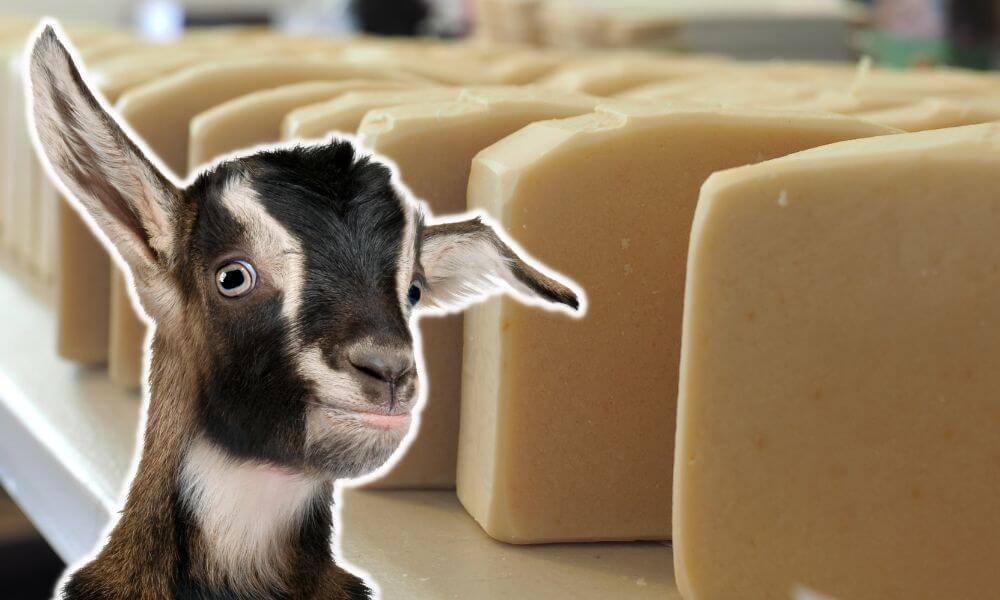The reality is that there’s no reason to use antibacterial soap if you aren’t in a hospital environment.
In fact, the effect can actually be detrimental, containing harsher chemicals, promoting antibiotic resistance, and are just not more effective for everyday use than things like goat milk soap.
Let’s look further into this.

What is antibacterial soap?
You might assume that all soap is antibacterial.
After all, that’s what soap is supposed to curb the spread of, right?
Well, yes.
But antibacterial has quite a specific meaning which does not apply to most soaps.
Antibacterial is soap that uses much harsher chemicals to actually kill the germs.
Not only that, but there is a substance in many antibacterial soaps called Triclosan, which stays on your hand and continues to kill germs after you’ve washed.
Ordinary soap does not actually kill germs.
It simply washes them off.
The only place where antibacterial soap is really used is in hospitals.
This is where patients with compromised immune systems need an added layer of protection against bacteria, so staff and visitors need to kill the germs.
So, although you might think soap is, by nature, antibacterial, it isn’t in the sense that it kills the germs—only that is washes them away.
So, is goat milk soap antibacterial or not?
Is goat milk soap antibacterial?
No, it isn’t.
Goat milk soap is an ordinary, commercially available soap that ordinary consumers can buy, and which is not intended for hospital use.
Therefore, there is no reason for it to be antibacterial.
Goat milk soap is a great choice of soap and has lots of benefits, as I will get into later, but it isn’t antibacterial.
Don’t forget, though, that this is a good thing.
Antibacterial soap is not for everyday use, for a variety of reasons.
Firstly, goat milk soap only washes away the bacteria, meaning that they are not left to develop immunities to the antibacterial substance.
This leads to infections that are resistant to antibiotics.
Healthy flora on your skin is just as important as washing your hands of harmful germs.
Your body, whether you like it or not, is an ecosystem, and that ecosystem keeps you happy and healthy.
Killing all the germs is not necessary or desirable.
Water needs a surfactant like soap to break up the surface tension, avoiding the water beading up and making it easier to wash them.
So, with all this in mind—why should you choose goat milk soap over any other kind?
| Related Articles |
|---|
Benefits of goat milk soap
There are many benefits to using goat milk soap.
Firstly, it’s an exceptionally gentle cleanser for your skin.
Goat milk soap is rich in fats like caprylic acid, which preserves the skin’s natural oils and moisture.
This is much better than many typical soaps which strip it away.
It’s also rich in nutrients that can be absorbed through the skin.
Vitamin A and the mineral selenium both exist in high concentrations in goat milk soap.
The moisturizing quality of goat milk soap also helps dry skin.
Goat milk soap rehydrates the lipid barrier, which is where most of the moisture in the skin is lost.
It’s also a natural exfoliant.
It contains, among other things, natural exfoliators like lactic acid.
These strip away dead skin from the top layer, cleansing and again helping to keep the skin hydrated.
Why, then, if it has all these benefits, is it not antibacterial?
| Related Article |
|---|
Why isn’t goat milk soap antibacterial?
If it has not already been made clear, antibacterial soaps are simply not available for the average consumer.
They are not necessary and are in fact worse than non-antibacterial soaps.
Even just in the sense that antibacterial soaps are far harsher on the skin, most people would not buy them even if they were available.
The substances which linger to kill germs also make the skin feel dry and unpleasant.
Goat milk soap is not just for washing, but also moisturizing, exfoliating, and generally promoting healthy skin.
Antibacterial soap is about protecting patients in hospitals.
Much of the messaging and advertising around cleaning products over the years has come to present the idea that killing germs is better than simply washing them away.
In certain environments, this is obviously true.
Hospitals need to stay as sterile as possible since the people in there are already sick.
Nurses and doctors could carry deadly pathogens to immuno-compromised patients.
In that context, it makes sense to kill the germs.
Everywhere else, it would have an overall negative effect.
You don’t need to worry about antibacterial soap.
